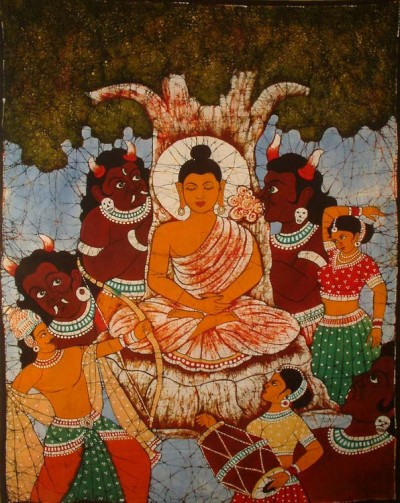I have been reading The Heart of the Revolution by Noah Levine and a part stuck with me that I would like to share. When I read the part about the Buddha and Mara, I moved right on without extra deep reflection, but it kept resurfacing in my thoughts long after the fact. Here are some highlights I made- I am posting from my phone so forgive my punctuation!
--
(After enlightenment) the Buddha continued to experience an aspect of his mind that he referred to as Mara- that aspect of the mind that experiences craving, aversions, and doubt.
The Buddha responds to each attack with wisdom and compassion. In response to doubt, the Buddha reflects on all the hard work... He inclines his mind and heart toward faith and confidence based on the progress that he has made so far.
Mara came back regularly to see if the wisdom and compassion of the Buddha had wavered. Fear, desire, and doubt still arose in the enlightened Buddhas mind. The difference was that he responded each time with "I see you, Mara." He did not take Mara's visitations personally and did not feel that he had to act on them; he saw fear, desire, and doubt as they were and responded with care and understanding.
Becoming friendly with ourselves has to include every aspect of our being, including every manifestation of Mara.
(End Noah Levine excerpt)
These little excerpts in one form or another have been rattling around my empty brain so I thought sharing might be beneficial to someone! I think there is a lot to reflect on there, and it was easy to miss- the profoundness stands out when quotes are pulled, but I feel I was precariously close to missing a lesson when it was buried in the chapter! I will now cease rambling.
Thank you, Noah Levine.
In gassho to all,
Seizan
Ps I will edit this from a real computer soon!
--
(After enlightenment) the Buddha continued to experience an aspect of his mind that he referred to as Mara- that aspect of the mind that experiences craving, aversions, and doubt.
The Buddha responds to each attack with wisdom and compassion. In response to doubt, the Buddha reflects on all the hard work... He inclines his mind and heart toward faith and confidence based on the progress that he has made so far.
Mara came back regularly to see if the wisdom and compassion of the Buddha had wavered. Fear, desire, and doubt still arose in the enlightened Buddhas mind. The difference was that he responded each time with "I see you, Mara." He did not take Mara's visitations personally and did not feel that he had to act on them; he saw fear, desire, and doubt as they were and responded with care and understanding.
Becoming friendly with ourselves has to include every aspect of our being, including every manifestation of Mara.
(End Noah Levine excerpt)
These little excerpts in one form or another have been rattling around my empty brain so I thought sharing might be beneficial to someone! I think there is a lot to reflect on there, and it was easy to miss- the profoundness stands out when quotes are pulled, but I feel I was precariously close to missing a lesson when it was buried in the chapter! I will now cease rambling.
Thank you, Noah Levine.
In gassho to all,
Seizan
Ps I will edit this from a real computer soon!




Comment